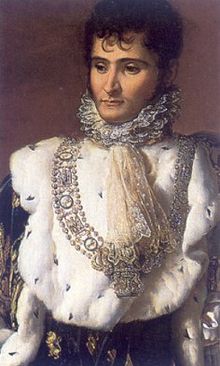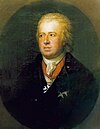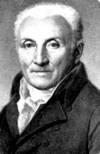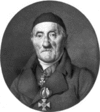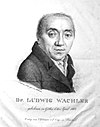Imperial estates of the Kingdom of Westphalia
The imperial estates of the Kingdom of Westphalia were an early form of a parliament in the Kingdom of Westphalia between 1807 and 1813. The institution was the first constitutional representation of the people in Germany. It only met in two session periods and had little influence.

Tasks and organization
In the Old Kingdom , estates existed in many countries as representatives of the nobility and the churches. With the founding of the Napoleonic model countries as part of the Rhine Confederation in Germany, such assemblies of states were set up on the basis of constitutions for the first time . The MPs were seen as representatives of the people, no longer of a class.
In the Kingdom of Westphalia, this constitution was the Constitution of the Kingdom of Westphalia of November 15, 1807. In Articles 29 to 33 and 39 to 44, it regulated the composition, election and competencies of the imperial estates.
The 100 members were elected indirectly by electoral colleges from their respective departments. The Kingdom of Westphalia was divided into eight departments based on the French model . These were not named after the main towns or the traditional regional names, but deliberately after rivers in order to document the break with the previous administrative structure.
Elections were made separately according to the electoral groups of landowners, merchants / manufacturers and scholars, artists and deserving citizens. The class belonging to the nobility or the bourgeoisie no longer played a legal role. Instead, only the census was the eligibility criterion. The landowners dominated. In this respect, the imperial estates were geared towards an owner company, as the reforms of the Confederation of the Rhine strived for. Each of the departments had a fixed number of representatives, graduated according to size.
| Department | electors | MPs | including landowners | including merchants | of it scholars |
|---|---|---|---|---|---|
| Elbe department | 225 | 13 | 9 | 2 | 2 |
| Fulda department | 216 | 13 | 9 | 2 | 2 |
| Harz Department | 201 | 11 | 8th | 2 | 1 |
| Leine department | 200 | 8th | 5 | 1 | 2 |
| Oker department | 228 | 14th | 10 | 2 | 2 |
| Saale department | approx. 200 | 11 | 8th | 1 | 2 |
| Werra department | 224 | 13 | 9 | 2 | 2 |
| Weser department | 300 | 17th | 12 | 3 | 2 |
| total | 100 | 70 | 15th | 15th |
The electoral process stipulated that an electoral college of 80 to 300 men was formed in each department. These men were chosen by King Jérôme Bonaparte from the list of all men eligible for election in this department. The electoral college in turn elected the actual deputies from among its members, who were then appointed by the king.
Landtag sessions
The imperial estates should meet once a year as part of a state parliament session. The MPs already received diets . Whereas in the old estates assemblies, votes were usually taken according to estates and each estate had to agree on a vote, in the Westphalian imperial estates each member had his own vote. Another new feature was that the parliamentary sessions were public. The Palace of the Stands in Kassel had seats for the interested public. The negotiations were also made public.
Parliament did not have the right to meet of its own accord. It had to be convened by the king. The imperial estates met in the Estates Palace, today's Museum Fridericianum in Kassel . The king only called the parliament to two state parliament sessions (1808 and 1809). The sessions lasted about six weeks each (July 2, 1808 to August 22, 1808 and January 28, 1810 to March 12, 1810). The session of the Landtag ran as follows: The king convened the estates by royal decree. The 1808 session was convened by decree of May 15, 1808.
In good time before the session, the King appointed the President of Parliament. Carl Friedrich Gebhard Graf von der Schulenburg-Wolfsburg became president for both sessions . The course of the session was determined by the chief master of ceremonies, Count von Waldburg.
The king opened the state parliament session with a speech from the throne in the stalls of the orangery. The MPs and the President were then sworn in. In the second plenary session the parliament elected the secretaries of the imperial estates and the members of the commissions. The meeting closed with an address of thanks from the deputies to the king.
The actual legislative work took place in the subsequent plenary sessions. There were a total of 14 plenary sessions in 1808, of which 10 in the 1809 session, all in 1810.
The stalls were also closed by royal decree. The closing ceremony was celebrated at the last plenary session. Each speaker was a Council of State (i.e. a member of the government).
Tasks and role in the legislative process
The imperial estates set up four committees, each of which consisted of three members: the finance commission, the civil justice commission and the embarrassing judiciary commission.
The main tasks were to participate in the legislative process, especially the budget laws. Parliament had no right of initiative; the government submitted bills to it. Without the consent of Parliament, only provisional regulations by royal decrees were possible.
The legislative procedure provided that bills were drawn up in the State Council and discussed with the responsible commissions. The possibly revised draft was then submitted to the imperial estates and decided or rejected there without consultation. The king then put them into effect and announced them. In particular, the lack of consultation and debate distinguishes the way the Imperial Estates work from that of later parliaments. The constitutional role of parliament was expressed: on the one hand, advising the king on the commissions and, on the other hand, symbolically representing the (tax-paying) subjects.
The low importance of parliament was due to the war-related circumstances. In addition, the imperial estates lacked a social basis. The composition was based on the French civil society notabels , which did not yet exist in this form in Germany. In the Kingdom of Westphalia, the nobility and not the bourgeoisie represented the top taxpayers. The nobility dominated the assembly numerically. In both sessions of the estates, the majority of the MPs rejected the abolition of the noble tax privileges. In doing so, Parliament violated the constitutional principle of equality.
Members
literature
- swell
- Constitution of the Kingdom of Westphalia (1807) Text of the legal bulletin of the Kingdom of Westphalia, First Part, Kassel 1808, No. 1, pp. 1–31 (text reproduction based on Hans Bold (ed.): Reich und Länder. Texts on the German constitutional history in the 19th century. and 20th century )
- Severin-Barboutie Bettina, The Imperial Estates of the Kingdom of Westphalia - Precursors of Modern Parliaments (1807–1813), in: German History in Documents, DG 01104/1807, Braunschweig 2011.
- Representations
- Jochen Lengemann (Ed.): Parliaments in Hesse 1808–1813. Biographical handbook of the Imperial Estates of the Kingdom of Westphalia and the Estates Assembly of the Grand Duchy of Frankfurt. Insel-Verlag, Frankfurt am Main 1991, ISBN 3-458-16185-6 .
- Wolfram Siemann : From confederation to nation state. Germany 1806–1871. Munich 1995.
Web links
Individual evidence
- ^ Wolfram Siemann: From confederation to nation state. Germany 1806–1871. Munich, 1995. pp. 26f.
- ↑ Law Bülletin of the Kingdom of Westphalia (GBüll KW) 1808, 1st part, No. 1, page 2 ff. Volume 1 of the law Bülletin is here ( Memento of the original from March 13, 2008 in the Internet Archive ) Info: Der Archive link was inserted automatically and has not yet been checked. Please check the original and archive link according to the instructions and then remove this notice. Available online
- ↑ Article 34 of the Constitution of the Kingdom of Westphalia
- ↑ Royal Decree of March 18, 1808, which determines the activities of the electoral colleges of the kingdom as well as the manner in which they are to be kept, GBüll KW 1808, Part 1, No. 24, page 456 ff.
- ^ Elisabeth Fehrenbach : From the Ancien Regime to the Congress of Vienna. Munich, 2001. pp. 88f.
- ↑ Royal Decree of May 10, 1808, which determines the compensation granted to members of the estates for travel and subsistence expenses during the duration of the meetings, GBüll KW 1808, Part 2, No. 39, page 44 ff
- ↑ GBüll KW 108, Part 2, No. 39, p. 48ff.
- ↑ Decree of June 14, 1808; GBüll KW 1808, Part 2, No. 44, pp. 190 ff.
- ↑ Westphälischer Moniteur No. 80, June 30, 1808, p. 321 ff.
- ↑ for the 1808 session: Royal decree of August 19, 1808, which determines the point in time when the session of the stands is to be closed (GBüll KW 1808, Part 2, No. 50, page 318 ff.)
- ↑ 1808 was State Councilor Johannes von Müller , after his death from 1810 State Councilor Justus Christoph Baron von Leist was his successor.
- ↑ Fehrenbach, Ancien Regime, p. 89
